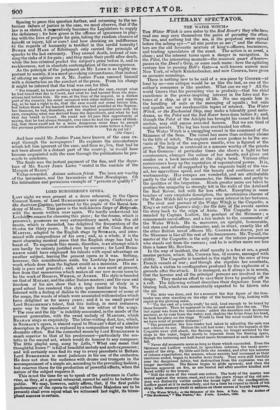LORD BURGHERSH'S OPERA.
LAST night we were present at a dress rehearsal, in the Opera -Concert Room, of Lord BURGHERSH'S new opera, Catherine, or $1se AustrianSoptive,:ipeKormed by the pupils of the Royal/Ica- demy of Music., This piece is the well-known Siege of Belgrade; with the music written over again. We hardly understand LordsliVs reason for choosing this piece ; for the drama, which is preserved, posSesses no very extraordinary merit, while the old music, which is discarded, has delighted the frequenters of the theatre for thirty years. It is the music of the Cosa Rara of MARTINI, adapted ton the English stage by STORACE, and inter- mixed with compositions of his own; and, as a whole, it is the most charming musical piece that the English stage has had to boast of • To supersede this music, therefore, is an attempt which can hardly be entirely justified even by success ; for Lord BURG- HERSH could have employed his talents with equal advantage on another subject, leaving the present opera as it was. Setting, however, this consideration aside, his Lordship has produced a -work which does him the highest credit as a musician. His me- lody is pure and graceful ; and, what is a rare merit at present, free from that mannerism which makes all our new music seem to be the work of Rossinr, WEBER, or AUGER.. His style is founded -on that of MOZART, and the older Italian masters ; and the ease and freedom of his airs show that a long course of study in a good school has rendered this style quite familiar to him. We listened with a feeling of dislike to the commencement of some of the sown, the words of which were associated with melodies which have delighted us for .many years ; and it is no small proof of Lord BURGHERSH'S talent, that this feeling, in most instances, gave way to the excellence of his new edition of the songs. The rose and the lily" is indelibly associated, in the minds of the present generation, with the sweet melody of MARTINI, which Bamws sings so exquisitely. The letter-writing duet, too, which, in STORACE'S opera, is almost equal to MOZART'S duet of a similar description in Figaro, is replaced by a composition of very inferior dramatic effect. Figaro, But the concerted music by Lord BURGHERSH is much superior to that of his predecessor—particularly the ses- tetto in the second act, which would do honour to any composer. The little playful song, sung by Lila," What can mean that thoughtful frown ?'! is full of beautiful melody and arch expression ; and will certainly soon find its way to every pianoforte in Britain. Lord BURGHERSH is most judicious in his use of the orchestra. He does not stun the audience with drums and trumpets in the accompaniment of a simple air, according to the prevailing fashion; but reserves these for the production of powerful effects, when the nature of the subject requires it. This is not the time for us to speak of the performers in Cathe- rine, as they, .at a general rehearsal, cannot be said to be before the public. We may, however, safely affirm, that, if the first public performance of The opera to-night (when,their Majesties are to be present) shall even equal what we witnessed last night, its trium- phant success is certain.


























 Previous page
Previous page